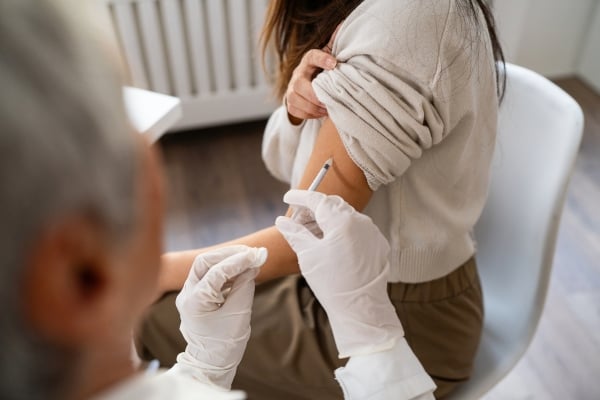To stop the spread of COVID-19, many colleges and universities implemented vaccine requirements for their students returning to campus. Now, these policies are less common for the COVID-19 vaccine, but many continue to require students to provide proof of immunization against other diseases, including meningitis, measles, mumps, rubella and tetanus.
Researchers at Temple University, with support from the Children’s Hospital of Philadelphia, have completed a series of studies to understand college students’ perceptions of vaccines and vaccine requirements, specifically related to the COVID-19 vaccine, and most recently sought to understand students’ general feelings about vaccines and vaccine education.
The recently published article in the Journal of American College Health finds a majority of students acknowledge the importance of vaccines, but one-third say they don’t know where to find information about vaccines on campus.
Survey Says
A late April/early May 2021 Student Voice survey by Inside Higher Ed and College Pulse found 85 percent of students had gotten at least one dose of the COVID-19 vaccine or planned to. The vaccine first became available to anyone age 16 or up on April 19 that year, and by May 22, 57 percent of U.S. adults aged 18 years and up had received at least one vaccine dose, according to the Centers for Disease Control and Prevention.
What’s the need: College students are an interesting population for vaccination because they’re in a transition stage for making their own medical decisions and are at greater risk of exposure for some vaccine-preventable diseases while enrolled, researchers wrote.
Prior research shows fewer than half of college students are up to date on vaccinations for hepatitis b; HPV; meningitis ACWY; measles, mumps and rubella (MMR); tetanus, diphtheria and acellular pertussis (Tdap); and varicella, and closer to two in five college students received their annual influenza vaccine. An earlier study in this series found students are generally unaware of vaccine requirements or unable to discern which vaccines were required versus recommended.
“As such, this study aimed to assess students’ knowledge and perceptions about specific vaccines, trusted sources of vaccine information, and their interest in learning more about vaccines,” according to the article.
Researchers hope to identify effective strategies for future vaccine education interventions to increase knowledge and uptake among university students.
Vaccine perceptions and knowledge: The study included survey responses from 2,223 students attending four universities across Pennsylvania, fielded between March and May 2023. The greatest share of respondents were undergraduate learners (47 percent), but the sample also included graduate and professional students.
Survey results showed 91 percent of students agreed it is important to be vaccinated against disease in general, while 3 percent disagreed.
When asked their opinions on various childhood or adolescent vaccines, student responses ranged. Almost all respondents indicated the MMR vaccine is important (96 percent), but fewer saw influenza (71 percent), COVID-19 (75 percent) or HPV (88 percent) vaccines as important.
Among those who disagreed with the importance of vaccines, 57 percent were not fully vaccinated against COVID-19, which researchers defined as having received two doses of the vaccine, and 12 percent had received the flu shot that year.
First-year students were more likely to say they saw vaccines as important, compared to their second- through fourth-year peers, as were students living in campus housing.
Around three in five students said they had above average or excellent knowledge of vaccines, with health professions majors reporting above average knowledge of vaccines, compared to their peers (77 percent versus 56 percent, respectively).
Learners were more likely to say they had above average knowledge for COVID-19 vaccines (72 percent), compared to other vaccines, which researchers theorize could be due to the age at which students received vaccines or media coverage of vaccines.
“Education at the high school or college level on routine childhood vaccinations may be needed to ensure students are knowledgeable of and able to make informed decisions about vaccines as they become independent adults,” researchers wrote.
How students receive information: When asked which sources of vaccine information students trust, most said health-care providers (83 percent), followed by the Centers for Disease Control and Prevention (74 percent) and other government organizations (33 percent). One in 10 students said they trusted their student health center as a source of information.
“If students are receiving any healthcare from campus-based healthcare professionals, then this disconnect may represent a missed opportunity for this group of healthcare professionals to play a role in educating students about vaccines,” according to the study. Vaccine information can also be one way to build trust among students for services beyond acute care, as well.
On campus, students said they receive vaccine information from the college website (44 percent), discussions with the student health center (39 percent) or educational brochures (35 percent). Just under one-third of students said they don’t know what informational resources are available at their institution.
Over 30 percent of respondents indicated they would be interested in learning more about vaccines, and a similar number said maybe they would be interested.
Topics that are most interesting to students include the development of vaccines (41 percent), vaccine safety and effectiveness (40 percent), risks and benefits of vaccines (39 percent), and vaccine recommendations (33 percent).
The best way to provide this information? Videos and brochures were the most popular responses, as were podcasts and lectures. A lack of interest in in-person vaccine education signaled to researchers that students are interested in receiving information when convenient or when it aligns with their busy schedules.
Do you have a wellness tip that might help others encourage student success? Tell us about it.








